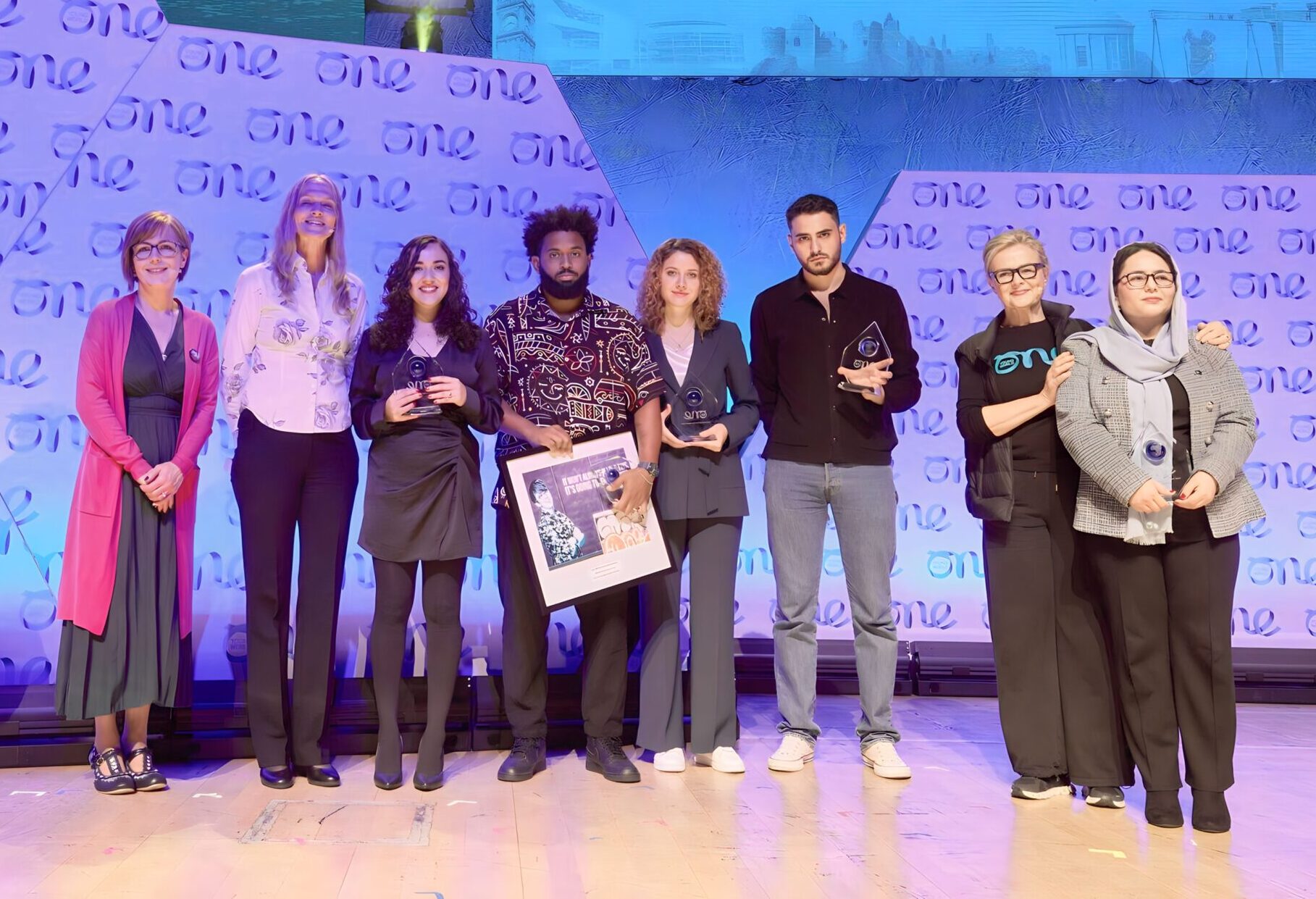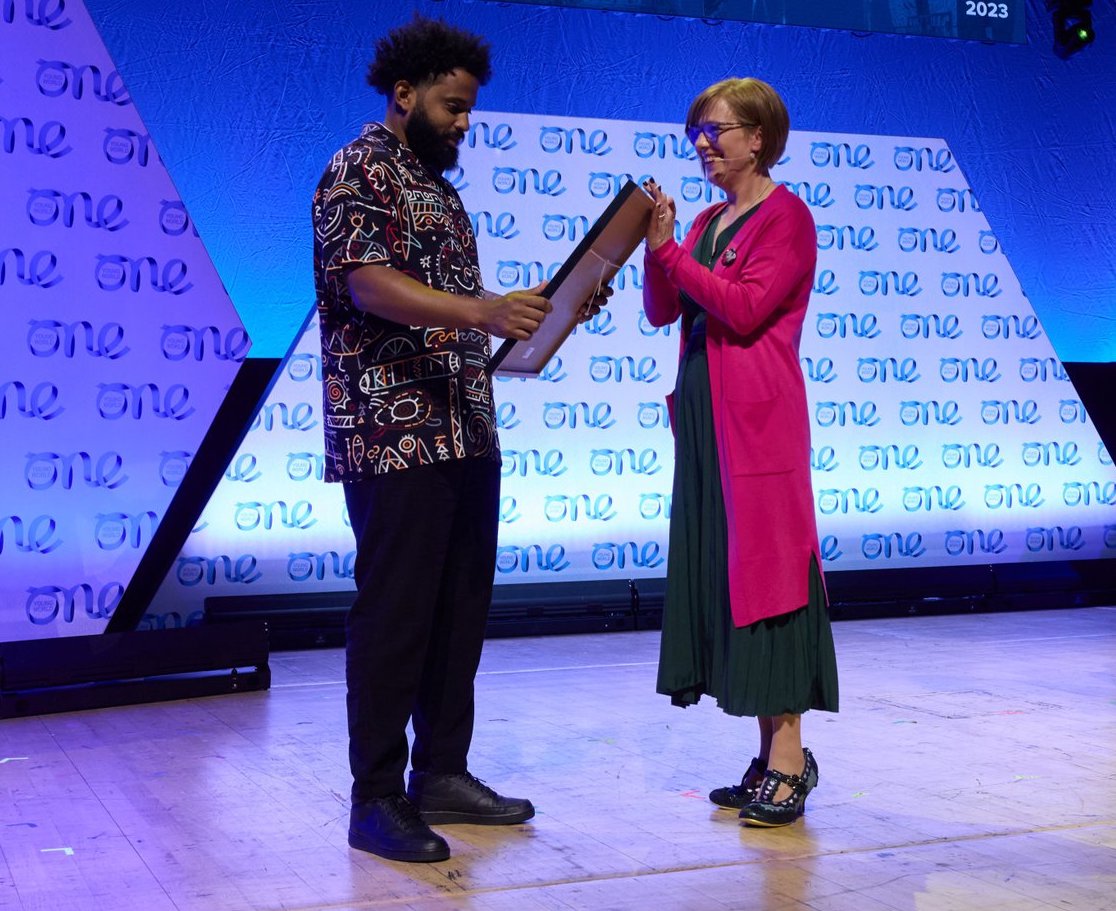Mexican journalist Laura Sánchez Ley and Cuban journalist Abraham Jiménez Enoa received on Thursday, Oct. 5, the 2023 Journalist of the Year Award from the One Young World organization. The award, presented during the organization's annual summit, recognizes journalists between the ages of 18 and 35 whose work has had a positive impact on the struggle to guarantee freedom of expression and respect for human rights around the world.
During the awards ceremony, held in Belfast, Northern Ireland, Jiménez Enoa was also recognized with the Lyra McKee Award for Bravery, which was presented for the first time at this year's One Young World Summit.
"Being a journalist means being at the service of the people, who are almost always the people who have the least power, are the most discriminated against, those who suffer the most. Often times we have to go against the current, put our body, our mind at risk, to provide that service. A service that not only explains the world to those who want to understand it, but also helps us make the world a bit more just. That’s our sole aim: justice," Jiménez Enoa said in his acceptance speech.
The new award was named in honor of Northern Irish journalist and LGBTQ+ rights activist Lyra McKee, who was murdered in 2019 while reporting on violence in the city of Derry. The award was established this year to recognize “some of the most courageous people who are upholding the values of journalism in their stories, and creating a more free and informed world," according to the organization.
Congratulations to @JimenezEnoa for winning the Lyra McKee Award for Bravery.
We are honoured to be introducing an additional accolade as part of this year's Journalist of the Year Award in recognition of the life and work of Lyra McKee.
Lyra was a remarkable young journalist… pic.twitter.com/YdlQNPWUht
— One Young World (@OneYoungWorld) October 5, 2023
"Lyra Mckee's career was cut short by those who fear the truth. She is a role model for all of us who are dedicated to this profession," Jiménez Enoa said during the ceremony. “That’s why receiving this award with her name on it obliges me not to abandon this profession, to continue pursuing the truth and to continue unmasking power. Because that’s what Lyra did. And because that’s the best way to honor her legacy.”
Jiménez Enoa has lived in exile in Spain since 2022, when his country's authorities gave him a choice between leaving Cuba or going to prison, following a long history of harassment as a result of his journalistic work. Even though the attacks against him have continued even while he’s outside Cuba, he continues to write in exile in various news outlets about the situation on the island.
"I belong to a generation of Latin American journalists who’ve had to leave their country, who’ve gone into exile. Exile is putting a dent in the profession and many people are leaving journalism," Jiménez Enoa told LatAm Journalism Review (LJR) prior to the ceremony. "This award reinforces the idea [...] of continuing to do journalism, and that we must continue to tell the story of Cuba.”
One Young World is a London-based non-profit organization that seeks to bring together and empower young leaders from around the world to develop solutions to major problems affecting the planet. It shone the light on Jiménez Enoa's bravery for exposing serious human rights violations at the hands of the Cuban regime in his stories and columns published in news outlets such as The Washington Post, The New York Times, BBC World, Aljazeera, Vice News, El País, and Gatopardo magazine, as well as for the narrative journalism outlet he co-founded in 2015, El Estornudo, which was one of the first digital news outlets to be blocked by Cuban authorities.
“Jiménez Enoa has devoted himself to revealing the true realities of life under authoritarian rule in Cuba. His work has come at the expense of repeated persecution by the Cuban authorities. Despite facing violent interrogations, arbitrarily enforced restrictions, blocked internet access, and house arrest, he continued writing, cementing himself as an outspoken critic,” the organization said in announcing the winners.
For Jiménez Enoa, having courage is the only alternative for a journalist who wants to tell the world what is really going on in Cuba. For that reason, he said he accepts with modesty the merits observed in him by the One Young World jury of experts that selected this year's winners.
"Cuba is a country that has gone without journalism for six decades because there are laws that prevent it. Just being a journalist there makes you a criminal, you’re breaking the law. It’s a country with no freedom of the press or freedom of expression," Jiménez Enoa said. “To raise your voice there and say what many people for decades have not said, to confront power and put forth your body, your words and have that boldness is what caught [the jury’s] attention.”
For her part, Sanchez Ley said that being chosen as one of the five winners of the Journalist of the Year award made her feel honored and deeply moved. At the same time, sharing the award with colleagues from war zones or high-risk areas in which to practice journalism made her ponder her country's place among those regions.
"I was quite moved to think that somehow a journalist in Mexico is at that level, that we are so bad off. [The jury] evaluates everything that has to do with the risky work we do in our countries," Sánchez Ley told LJR prior to the Summit. “In this case [of Latin America] it was Mexico and Cuba’s turn. I think this makes sense because Mexico is one of the most dangerous countries in the world for journalism. I believe it also has to do with that, with the issue of practicing it under such levels of emotional, physical pressure, and such lack of safety.”
For Sánchez Ley, the award is an opportunity to make visible worldwide the situation of violence and precariousness in which journalism is practiced in Latin American countries, particularly in Mexico, where in 2022 alone at least 13 press workers were murdered.

Along with Sánchez Ley and Jiménez Enoa, journalists Hanna Liubakova (Belarus), Mohammed El-Kurd (Palestine) and Zahra Joya (Afghanistan) also received the Journalist of the Year award. (Photo: Courtesy of Abraham Jiménez Enoa)
"We really live in risky, very precarious conditions in this country. Every time we see more and more journalists murdered, we see that it becomes more difficult to work, also because of political pressures, because of media issues," she said. "I think we’re at a huge breaking point in our country and I am very interested in making this known. Maybe sometimes this comes out as sketchy information [abroad] and I think this is a good time to voice it."
Two of the murders of Mexican journalists last year hit Sánchez Ley hard emotionally, since they were colleagues with whom she had worked closely in her native Tijuana, in the state of Baja California. They were journalist Lourdes Maldonado and photographer Margarito Martínez, both of whom were killed in January 2022.
"They were people with whom I reported every day, with whom I went around on the street, with whom I grew up doing and learning journalism. That's why I want it to be heard how Mexico is still truly some of the most dangerous countries in the world to practice journalism," she said. "It’s important to ask Mexican authorities to react to what is happening in the country. [...] While we have demonstrated here a lot of times, I think it’s also important to demand from a different arena an objective and quick investigation, because that’s not happening."
The award jury highlighted Sánchez Ley's work in the construction of collective memory in Mexico through the declassification of archives on major cases of public interest. The journalist and her Argentine colleague Dardo Neubauer founded Archivero in 2022, a journalism project based on the opening of classified or "national security" files in Mexico.
“[Archivero] has brought to light political and judicial documents classified as state secrets and made them available to all citizens. A task that she considers extremely important in a country where official truths are constructed every day and relevant investigations are hidden,” said the One Young World jury.
Along with Sánchez Ley and Jiménez Enoa, other Journalist of the Year award winners were journalist Hanna Liubakova (Belarus), journalist and poet Mohammed El-Kurd (Palestine), and journalist Zahra Joya (Afghanistan).
The jury included Univision news anchor Ilia Calderon (Colombia), journalist and documentary filmmaker Tanya Talaga (Canada), Sky News anchor Yalda Hakim (Australia), journalist and human rights advocate Hossam Bahgat (Egypt), and investigative journalist Solomon Serwanjja (Uganda).
Jiménez Enoa, who last year launched the book "La Isla Oculta" (The Hidden Island), which compiled a series of crónicas about his country, has been the victim of at least three episodes of harassment since living in exile. These inicidents, which were registered by the Committee to Protect Journalists (CPJ), make him think that the Cuban regime knows his location and is following his steps.
In July of this year he reported that, while he was walking with his son near his home in Barcelona, two men with Cuban accents threatened him and told him they knew where he lived. A month earlier, at a book fair in Madrid, an individual also with a Cuban accent followed and took photographs of him. And in March 2022, during a conference in Amsterdam, a man tried to discredit him and accused him of being a liar.
Although he considers these episodes a delicate situation, Jiménez Enoa decided to denounce them publicly. The result was that other Cuban journalists, artists and activists in exile also began to speak publicly about similar episodes of harassment.
"Even being far away, more than an ocean away, they keep watching you and keep trying to silence you," he said. "What happened with my denunciation in July was something very interesting, because it was the first time that at least one Cuban of my generation publicly denounced something in this way. And that opened things up so other colleagues also told about similar experiences."

Jiménez Enoa also received the Lyra McKee Award for Bravery, an award that was established for the first time at this year's One Young World Summit. (Photo: Courtesy of Abraham Jiménez Enoa)
Sánchez Ley, who has written alongside Jiménez Enoa in Gatopardo magazine, said she admires the work of her colleague and other Latin American journalists who continue to do journalism from exile.
"I find it very sad to have to leave your country because of political issues. It’s quite shocking and has nothing to do with migration for personal reasons. It really is an issue where you are forced to leave and you can't even return," Sánchez Ley said. "I really admire everything that journalists like Abraham [Jiménez Enoa] do, who have to keep reporting what is happening in their country from outside. It’s not easy.”
Both journalists believe that in Latin America the number of journalists who choose or are forced into exile will continue to grow, due to the proliferation of authoritarian regimes in the region. In Cuba alone, between 2021 and 2022, the organization Article 19 documented the forced exile of at least eight journalists. And in Nicaragua, at least 208 journalists have had to leave their country from 2018 to date, according to La Fundación Libertad de Expresión y Democracia.
"Nothing makes us think that at least in the short term the situation in the region is going to change, because authoritarianism and populism are evidently in fashion in politics and in our countries’ governments. Basically, the first thing they do is to target the independent press, or those who try to keep an eye on power. That’s why we are experiencing this wave of exile throughout the region," Jiménez Enoa said.